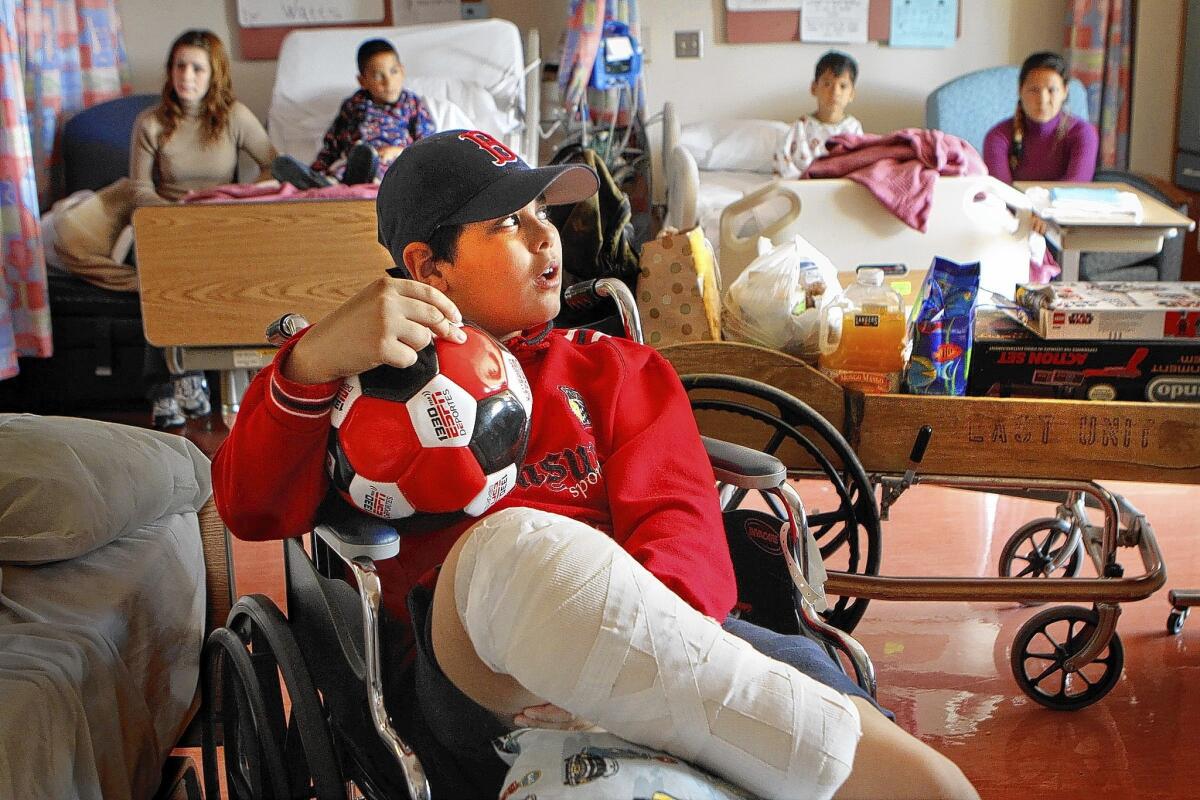Catching up with a Palestinian boy who’s learned to cope

- Share via
BEIT HANOUN, Gaza Strip — When I first met Abdullah Alathamna four years ago, he was laid up at a children’s hospital in Los Angeles, his right leg bound in a cast. He was pale, and grouchy from the pain pills. He was not at all interested in answering questions from a reporter.
He was an 11-year-old kid, injured and without his family, more than 7,000 miles from his home in the northern Gaza Strip.
The Palestinian youngster lost a foot in 2006 when the Israeli military accidentally shelled his house and several others while targeting militants who had launched rockets into Israel. Nineteen people were killed, including Abdullah’s mother and two sisters.
A nonprofit that provides treatment for injured Palestinian children had flown him to California to undergo surgery and be fitted for an artificial leg. Two previous procedures, one in the U.S. and the other in Dubai, had failed.
When he wasn’t at the hospital, Abdullah stayed with host parents George and Joan Abuhamad in Yorba Linda. They were warm and accommodating, and he got along well with their children. But when I joined them for lunch one day in the family’s shady backyard, Abdullah looked sad. Confined to a wheelchair, he couldn’t play like the others.
Last month, I walked through the heavily fortified border crossing that separates Israel from the Gaza Strip. I had come to do some reporting in Gaza, and had arranged to visit Abdullah while there.
Tension between Palestinian-controlled Gaza and Israel has escalated in recent months, with Israel launching a string of deadly airstrikes against militants who have fired hundreds of rockets into its territory.
But on the day I drove past blocks that had been reduced to rubble in earlier warfare, Gaza exuded an almost pastoral calm. Donkeys plodded down dusty streets, hauling carts of oranges, and groups of schoolgirls walked hand in hand, dressed in old-fashioned peacoats and white head scarves. It felt a universe apart from the Israeli towns just on the other side of the border wall, where the network of palm-lined freeways and shopping malls reminded me of my great-grandmother’s retirement community in Florida.
I had pulled over to the side of the road, trying to locate Abdullah’s house, when a young man knocked at my window. I assumed he was trying to sell me something and waved him away. He knocked again, harder, and cracked an expectant smile. It was Abdullah, who had grown from a pudgy, wheelchair-bound kid into a tall, good-looking teen.
Over coffee and slices of sweet persimmon in his family’s living room, Abdullah updated me on his life.
He said he was a top student at his high school and hoped to become a doctor one day. His father, Ramiz, has remarried; wife Mayada is pregnant with their third child. For Abdullah, fun consists of horsing around with his siblings, watching Egyptian comedies and playing soccer.
Abdullah not only walks without a limp, he also can play sports. Under tight jeans, the outline of his prosthetic leg was only faintly visible.
I asked him how it felt. “My leg is very well,” he replied, his accent reflecting the polite British English spoken by his schoolteachers.
I had sent an email to the Abuhamads in Orange County, asking whether they kept in touch with Abdullah. Joan said that the family called him several times a year, and that they once reached him while he was huddling for safety at an uncle’s house after an airstrike had destroyed a home next door.
“He was very scared,” she told me. “I so wanted to help him, to bring him back to us, but we couldn’t.”
When I asked Abdullah whether he was afraid for his safety and of future attacks, he smiled and breezily said, “No.”
The vulnerability I saw on his face four years ago in L.A. seemed to have faded. Or maybe it was simply masked.
Living in a violent region, there isn’t always time to dwell on anger or fear. To move on is to keep living. I have a strong feeling that the Israelis targeted by rocket attacks on the other side of the border have acquired similar coping techniques.
At one point, I tried to draw Abdullah’s stepmother into a conversation about Hamas, the Islamist militant group that controls Gaza.
“You want hummus?” she said, moving toward the kitchen.
“No,” I said, laughing. “Hamas. What do you think about Hamas?”
“I will make some hummus,” she said.
No doubt she understood my question, and it was her way of telling me she didn’t want to talk politics.
Instead she wanted to discuss Abdullah’s birthday. The next day he was turning 15. The family was having a party, and she wanted to know whether I would join them for cake.
More to Read
Sign up for Essential California
The most important California stories and recommendations in your inbox every morning.
You may occasionally receive promotional content from the Los Angeles Times.













